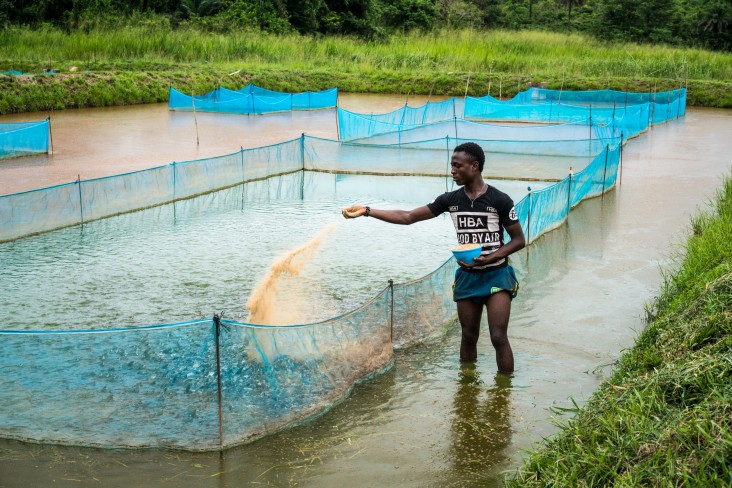Speeches Shim

May 2018 — Tonkolili district, located in northern Sierra Leone, is one of the hardest hit by child stunting due to high levels of food insecurity and malnutrition. Limited access to fresh fish and other food crops is a major factor leading to nutritional deficiency.
The fish available in the local markets are often dried and smoked marine fish of poor hygienic and nutritional quality due to long-distance transportation from the country’s Western Area. Income-generating activities in the district are limited, especially now with a decline in mining. Households rely largely on subsistence farming, which does not provide enough diversified food. This has further exacerbated malnutrition in women and children (especially girls), who often have less access to animal protein compared to male heads of household, suffocating their growth potential.
The challenge of ensuring access to fish grows tougher every day. Most of Sierra Leone’s poor still rely on catching wild stocks of fish from coastal and inland waters near their homes, but these stocks have fallen steadily in recent decades due to overfishing, climate change, pollution and other factors.
Abu Kargbo lives in Kamathor, a village in the Bumbuna community in Tonkolili. A husband, father, teacher, farmer and fisher, Kargbo is also head of a new committee that oversees fishing practices in his village.
In 2015, a Feed the Future project funded by USAID began implementing several new aquaculture practices in Tonkolili to boost farmed fish production to increase food and nutrition security as well as livelihood opportunities.
The Sierra Leone Scaling up Aquaculture Production project trained farmers in basic fishing and vegetable farming skills, including recipe testing. The farmers also learned to create seasonal food calendars to boost growing methods and provide nutritious foods, especially for women and children, during all seasons.
From June to August 2017, USAID’s partner in the project, WorldFish, formed seven cluster farmer groups of 10 members each and taught them how to construct fish ponds. The farmers were trained in good management practices, timely stocking of ponds, business and financial skills, and fish feed production using local ingredients. Group members also received seasonal fish farming loans from the Financial Services Association managed by Apex Bank.
The project used tilapia, suited to Sierra Leone’s ecosystem, as the founding fish population to breed throughout the district. Lead farmers were trained to provide farmer-to-farmer extension to other groups and ensure sustainability when the project ends.
Applying their new skills, Kargbo and his farmers group stocked the ponds in late August and early September 2017. The result is impressive — the seven cluster farmer groups produced and harvested 1.03 tons of farmed tilapia in Bumbuna in March 2018, six months after the first stocking. This first harvest generated a total income of about $700 (6.2 million Sierra Leonean leones).
Adoption of the new methods is spreading and already 20 farmers from four villages across Bumbuna community are now constructing their own ponds to stock them before the rainy season in July 2018.
“In our communities, fishing was practiced as a supplementary food need, not as a business. Now with tilapia fish ready to be farmed in ponds throughout the district and the new business skills we have learnt from this project, fishing will soon become a small-scale business in rural Sierra Leone,” said Kargbo.
From the first harvest, the farmers set aside a total of 90.4 kilograms of fish for home consumption, averaging 13 kilograms per household, which includes a total of 25 children and four lactating mothers. In addition to increasing their household fish consumption rate, within three weeks of the harvest, the farmers sold 880 kilograms of fish in Bumbuna.
In addition to directly increasing fish consumption in the community, WorldFish has worked to boost nutrition knowledge and promote behaviors that improve nutrition. In 2017, the project sponsored a month of intensive activities for 132 local youth, both school students and youth not attending school. The interactive learning focused on understanding the root causes of malnutrition in the local communities, the linkages to agricultural practices, and the potential to increase fish production to fill the void of animal protein.
The nutrition activities also highlighted how gender norms and disparities within households often leave women and children with less access to protein and nutritious foods compared to male members of households.
The Scaling up Aquaculture Production project, which ends in September 2020, supports development of the aquaculture sector in Sierra Leone to increase fish production and consumption as well as the incomes of small-scale farmers.
LINKS
Follow @USAIDWestAfrica, on Facebook

Comment
Make a general inquiry or suggest an improvement.